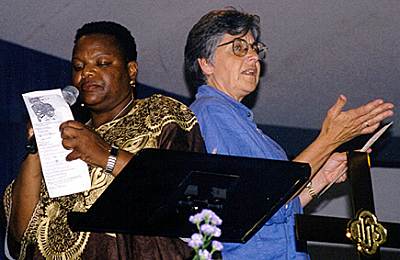Churches asked to lead
training
 |
|
Photo by Michael
Wacht |
|
The Florida
Conference Council on Ministries (CCOM) is asking churches with
unique or successful ministries to share them with other
churches at regional training events. Conference-wide events,
however, will remain an important part of the council's training
strategy. The CCOM will also continue to sponsor
nationally-recognized speakers, like the Rev. Janet Lynn Wolf
(right), former pastor of Hobson United Methodist Church in
Nashville, Tenn., who was the keynote speaker at this year's
conference-wide Discipleship Weekend. |
By Michael Wacht
LAKELAND — After more than a year of
conversations with and surveys of local church leaders, the Florida
Conference Council on Ministries (CCOM) has decided to ask churches to
play a lead role in providing leadership and spiritual formation
training.
This new direction by the CCOM encourages church
leaders to share their knowledge and skills with other clergy and
laity, according to the Rev. Carol Sue Hutchinson, director of the
CCOM’s Discipleship Ministry office. It’s goal is to foster
stronger relationships between leaders within local churches and the
conference.
Hutchinson said feedback from churches has been
key in shaping this new direction.
Church members expressed the need for more
firsthand training, according to Hutchinson. “Others want to go to a
church that’s making it happen and see how it works,” she said.
“We’re trying to encourage churches that have something unique to
set up training. We’ll offer support, but they’ll do the event.”
An example of that kind of training is The
Exchange Leadership Seminars coordinated by Suntree United Methodist
Church in Melbourne. Several Florida Conference churches that have
experienced success in ministry are sharing what they have learned
through a series of seminars scheduled this year and into 2002. Grace
United Methodist Church in Cape Coral is teaching transformational
children’s ministry; Trinity United Methodist Church in Gainesville
is offering training on the Alpha Program, a small-group Bible study
ministry; and Christ Church United Methodist in Ft. Lauderdale is
teaching local church transformation.
“No one way of doing things works for
everybody or every size church,” Hutchinson said. “Different
people learn in different ways and different styles, and we need to be
open to that concept of variety.”
People surveyed expressed a preference for
regional training, but they do not want to abandon large,
conference-wide events, according to Hutchinson.
“We can reach more people if we go regionally,
rather than holding training in one central location,” she said. “We’re
hearing that more people from a church will go to a regional event…because
people are not available to travel to get the training they need.”
Survey feedback has also shown that authorities
or consultants from outside the conference sometimes offer a greater
training value. “There’s so much out there that’s good, it doesn’t
make sense to reinvent the wheel,” Hutchinson said.
The CCOM is exploring partnerships with other
church organizations as another option.
The new focus is part of the CCOM’s goal to
help conference churches be more vital in their ministries, according
to Bill Walker, the conference’s director of connectional
ministries.
“We want to create an environment and
expectation in which leaders can be authentic and their authenticity
is welcomed and encouraged,” Walker said. “We want to avoid
behavior that discourages leaders from taking risks.”
An important aspect of that environment is
encouraging integrity among and relationship between church leaders,
both lay members who are leaders in the church and community and
pastors appointed to a church by the bishop.
The overall goal is to create a new environment
in the Florida Conference, according to Walker. “We want to create
an environment in which you, as a participant, are likely to find
health, affirmation, guidance and insight,” he said, “an
environment where the Holy Spirit is more likely to speak to your
soul.” |